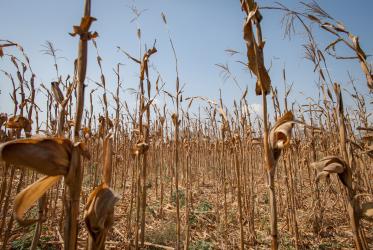Filipina church emergency programme manager Minnie Anne M. Calub looks to the prophet Isaiah for inspiration in rebuilding her country after the worst recorded typhoon smote her nation of islands in November 2013.
“'They will build houses and inhabit them; they will also plant vineyards and eat their fruit. They will not build and another inhabit, they will not plant and another eat," she quotes from Isaiah 65:21-22.
Calub is the emergency programme manager for the National Council of Churches in the Philippines (NCCP) and she spoke in Geneva recently of Typhoon Haiyan, the world’s most destructive typhoon ever to make landfall.
“This is the first Level 3 disaster ever declared in the history of the Philippines,” she said at the Ecumenical Stategic Forum in Bossey, held at the Bossey Ecumenical Institute on 21-22 May.
This catastrophic event “is proving to be a test of the capacity of the NCCP member churches as well as the 3-month old ACT Philippines Forum,” Calub told those present.
The typhoon ripped into the central Philippines on 8 November 2013.
“Its wrath affected more than 14 million people; more than 6,000 people were officially recorded dead; 1.1 million houses damaged; the livelihood of millions of farmers, fisher folk, and urban poor was destroyed,” rued Calub.
“The NCCP believes that our story must be shared, so I thank the organizers for this opportunity even as I hope I will do justice to this task,” the Filipina church worker said.
One of her colleagues, Almond, the NCCP livelihood officer in the Tacloban Field Office more than a year after the typhoon struck, felt frustrated with what he was seeing.
He went to the infamous tent city in Tacloban and spoke to residents.
“Most of them had houses and more dependable livelihoods before Typhoon Haiyan,” Calub explained. “Their houses used to be situated in the ‘no-build zones’ declared by the government, and they have not been able to find other gainful employment since then."
She said Almond realized the vulnerability and fragility of life and how in one instant everything can be taken away, with nothing left. He also saw “that his frustration was out of line.”
She continued, “He thought of the greater frustration of the people he was talking with as they rebuild their lives with extremely difficulty: the slow response of the government, the issue of land ownership, access to resources which are owned by a very few, and so many other impediments.”
“After reading Almond's story, it dawned on me more profoundly that, notwithstanding the help extended to a lot of people in the provinces of Samar and Leyte and Iloilo, there are still lots of challenges.”
Among these are how to engage in ecumenical cooperation for sustainable development, humanitarian assistance and peace-building in an era of economic liberalization and the increasing demands of global capital.
All this has promoted massive resource extraction for profit at the expense of extreme vulnerability and marginalization among the vast majority of people, leaving many unanswered questions.



